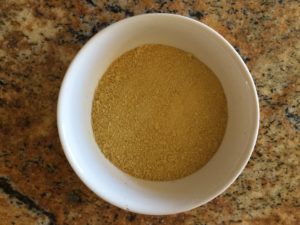Why You Should Add this Booster Food to your Daily Meals: Nutritional Yeast
By Karen Brennan, MSW, NC, BCHN®, Herbalist
Nutritional Yeast: What is it?
It is not a plant nor animal food but rather a fungus like mushrooms. It is a good addition to a vegan, vegetarian, paleo, gluten free and dairy free diet.
I have Candida, I am avoiding foods that contain yeast, can I eat nutritional yeast?
The yeast you find in breads and beer is a live and active yeast. Nutritional yeast comes in a dried flake form and is not an active yeast. This means you cannot use it to make bread or beer but more importantly it will not lead to overgrowth of yeast/candida in the body. Therefore, because it has been deactivated it cannot cause or contribute to candida. You may read otherwise on the web but nutritional yeast is safe to it.
What causes overgrowth of candida (healthy people will always have some candida) is a diet high in sugary/processed foods and drinks, antibiotic use and birth control pills to name a few root causes. To learn more about what candida is, what are more causes, symptoms and more importantly, how to address it read this article
What are the Benefits of Adding this Food into my Diet?
- Beta Glucan fibers found in nutritional yeast help to maintain the body’s defense against pathogens (this was found in a study in which participants consumed a spoonful daily)
- Another study in which participants consumed one half a spoonful found that mood states improved and they had significant boost in feelings of vigor.
- It is a great addition to vegan and vegetarian diets due to its protein and B vitamin content. It also has a cheesy taste so many use it to replace cheese in their diet.
- It contains all nine essential amino acids.
- It is a rich source of 14 minerals and 17 vitamins
- It has antiviral and antibacterial properties
- It may be useful for candida, chronic acne, diarrhea, and immune system support.
- Athletes use it for an energy boost
How Do I use it in My Recipes?
You can add nutritional yeast to many dishes that you make. Add it at the end to hot and cooked dishes as high temperatures may destroy the nutritional benefits of the yeast. For instance, add some to your cooked chicken curry dish or to your favorite pasta sauce.
- Sprinkle it on your stove topped cooked popcorn
- Add it into hummus, pesto, pasta sauces and cold soups
- Sprinkle onto your salads and cooked vegetables
- Use it as you would use grated cheese
- Add to bean and rice or whole grain dishes.
Recipes with Nutritional Yeast
- Here is a recipe for cheesy vegetarian pasta sauce Pasta sauce with nutritional yeast
- This detox salad makes a great side dish or use as a base to your one bowl meal.
Will my local Grocery Store Carry Nutritional Yeast?
- Your local traditional grocery store may not but many are adding healthier options. For instance, many Wal Marts and King Soopers now contain nutritional yeast products. Whole Foods and other local natural grocery stores and vitamin shops should carry nutritional yeast.
- Otherwise order online from www.thrivemarket.com, amazon or many other healthy whole foods or vitamin websites.
- Because I only use a small amount per day I store mine in a glass jar in the fridge to maintain freshness. Otherwise, store in your pantry or cupboard. It should keep for up to 2 years.
What You Need to Know
- Those with Gout may want to keep the amount to ½ a teaspoon per day due to its purine content
- You may have heard that some nutritional yeast products contain lead. These brands have no detectable lead in them-Bob’s Red Mill, NOW, Bragg’s, Dr. Fuhrman, and Red Star. However, no matter what the brand, it is safe to consume 2 tablespoons per day.
- Some nutritional yeast products contain B12 while others do not. Read the label. If you are a vegan or vegetarian and avoid meats, it is still best to supplement with B12 in a methylated form. It is a myth that B12 is naturally found in nutritional yeast-it must be added in.
- It does NOT contain MSG as you may hear this rumor. Yeast is a natural source of the umami flavor or natural glutamic acid. The glutamic acid is bound to other amino acids. The glutamic acid that is MSG is not bound. When you consume glutamic acid from real foods, your body controls how much is absorbed. Excess glutamic acid is passed off as waste not stored in your body. MSG that is added to fast food and processed foods is an excitotoxin that overexcites your cells.
Sources
http://nutritionfacts.org/2017/02/14/benefits-of-nutritional-yeast-to-prevent-the-common-cold/?
http://articles.mercola.com/sites/articles/archive/2016/04/04/nutritional-yeast-aspx
Bauman, E. & Friedlander, J. (2014) Foundations in Nutrition. CA: Bauman College
Wood, R. (2010) The New Whole Foods Encyclopedia. NY: Penguin Books
If you are sick and tired of feeling sick, tired, fatigued, depressed, anxious and more and have given up hope then Karen’s simple, effective, individualized and sustainable approach may be what you need.
Karen Brennan, MSW, CNC, Board Certified in Holistic Nutrition and Herbalist is the author of Tru Foods Depression Free Nutrition Guide; How Food Supplements and herbs can be used to lift your mood and owner of Tru Foods Nutrition Services, LLC.
For more information visit www.trufoodsnutrition.com
Get her Food Swap Guide here to get started on your health journey today! Want more information, like her fb page here
As a nutrition professional, Karen does not treat, cure nor diagnose. This information is for educational purposes only.



Leave A Comment
You must be logged in to post a comment.